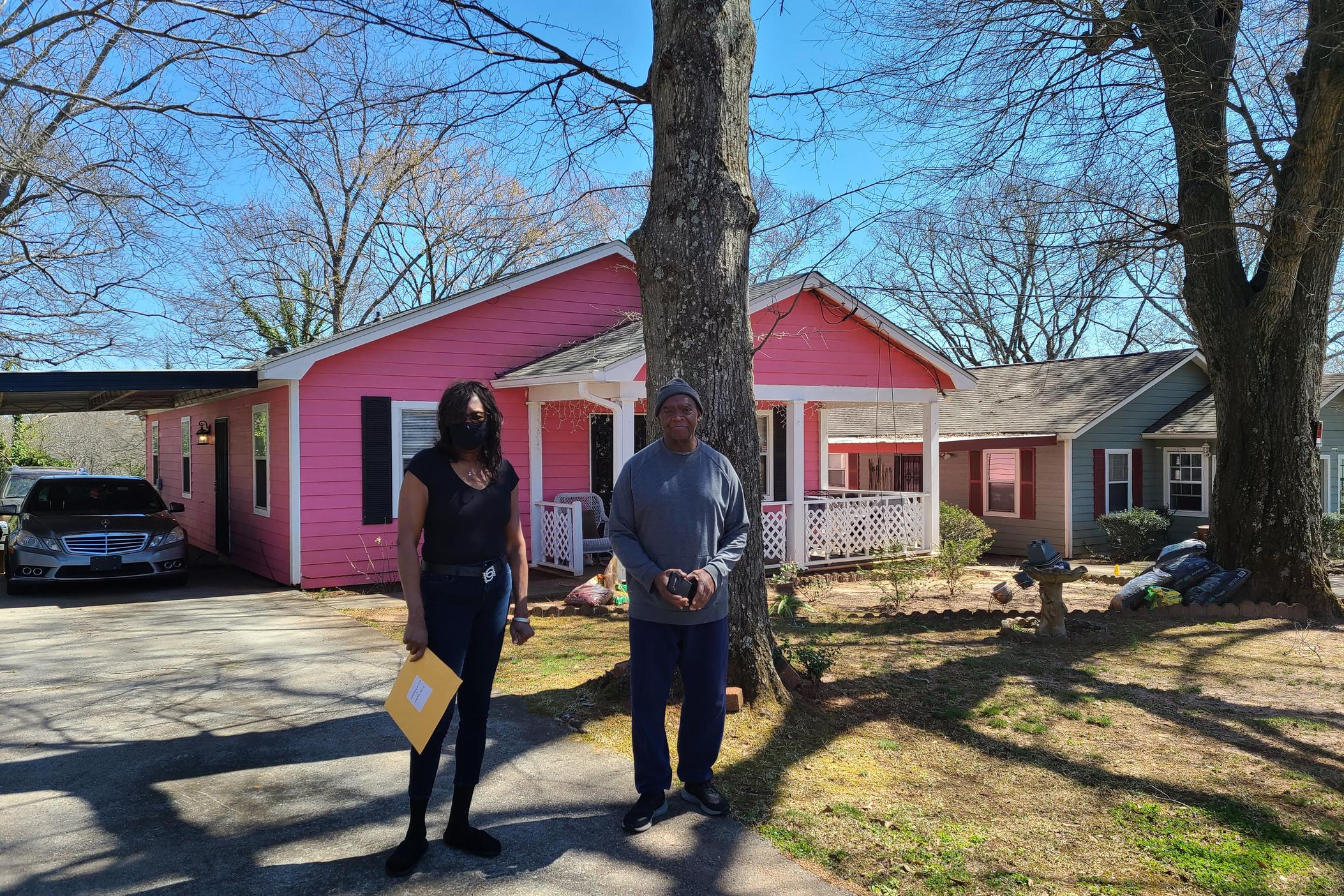Section Branding
Header Content
Longtime Atlanta residents face mounting bills waiting for affordable housing solutions
Primary Content
Leila Middlebrook has lived in Atlanta long enough to see six mayors, the Olympics, and two Atlanta Braves World Series wins. She lives in a small pink house near the end of Whitefoord street in the Edgewood neighborhood. It sits one story high, surrounded by taller condos and multi family homes in muted colors.
Middlebrook still remembers the day her house was built.
“This is a Habitat for Humanity house and I've seen a lot of things," she said. "This is the one of the first built houses, and I'm still very proud of that after the fact. The first stick of wood that we put on this, I put with my own hands. You take pride in that. I take pride in this house.”
That was back in 1993. She’s been in Edgewood nearly 30 years, and her neighbor Ron Hightower has lived there even longer. Hightower first moved to Edgewood with his family back in 1959 as a third grader. He said back then the neighborhood was mostly Black families.
“It was 100 percent at one time,” Hightower said. “Last white person that stayed here stayed over in that house right there. And then over the years, you know, everybody moved out.”
Since then, the demographics have changed — along with the prices in the area. As property values and the cost of living in Edgewood go up, many of the Black families moved to the suburbs. Now, wealthier, white residents are moving back in.
Adjusting for inflation, Hightower’s family bought their home for about $175,000. New residents are paying over twice that for homes in the area. Leila Middlebrook was shocked by how much people are spending.
“Somebody knocked on the door one time — my son was here, and I was gone," Middlebrook said. "When he answered the door, [the stranger] said 'How much, how much?' So he told him, 'It's not my house, it's my mom's house.' 'I’ll write her out a check right now for $350,000.' No, you willing to give a check for $350,000? You lying in the first place. You think I'm stupid?”
Despite Middlebrooks’s skepticism, an offer of about $300,000 lines up with what the Dekalb County Tax Assessors Office said her home is worth. Even though she only paid $38,000 for it originally, the average home in Edgewood is selling for over $400,000, which means Leila is paying a similar amount in property taxes to her younger, wealthier neighbors.
Which creates a problem: Newcomers bring money, push up property values, the property taxes rise, and locals can’t afford to stay in the neighborhood.
Atlanta’s newest mayor, Andre Dickens, has promised to address rising housing costs. During his first state of the city address he announced a new “housing strike force” to coordinate the city’s affordable housing efforts. Their goal is following up on Dickens campaign promise of “creating or preserving 20,000 units of affordable housing over the next eight years.”
Frank Fernandez is on the executive board of House ATL, the mayor’s affordable housing partners. He said long-term housing solutions will require systemic changes.
“The challenge is that we fund our schools, we fund our city and so much through property tax that if you get try to get rid of all of them, then how do you pay for services?” Fernandez said.
The real challenge is that the property taxes making housing unaffordable for so many residents aren’t set by the mayor. They’re set by school boards, county commissions, and city councils.
In Edgewood, that means talking to District 5 Atlanta City Councilmember Liliana Bakhtiari.
“We're researching everything from looking at universal basic income to assist seniors on fixed incomes to, like I said, hitting the pavement, knocking [on] doors, educating seniors on resources, and finding out exactly what they need,” Bakhtiari said.
Middlebrook’s home sits in the Dekalb County portion of Atlanta, so she pays taxes to the city and the county. However, Dekalb allows homeowners to freeze their county property taxes so they won’t continue to rise with the home value.
Bakhtiari said a similar freeze for Atlanta property taxes is worth looking into.
Even with her Dekalb taxes frozen, Middlebrook’s Atlanta taxes have more than quadrupled since 2014. So until a long-term solution arrives, she’ll keep pushing to stay in the neighborhood.
“I'm not going anywhere, by God's grace and mercy," she said. "We're making — God's making ways for us to pay our taxes."


